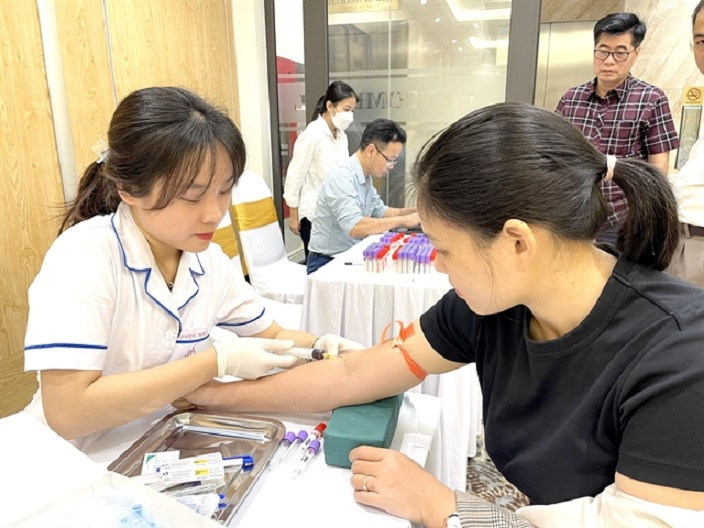
The Population Department under the Ministry of Health has advised citizens, especially those of childbearing age, to undergo health check-ups before marriage to give birth to children free of congenital Thalassemia.
Nguyễn Huy Thạch, director of the Haematology and Blood Transfusion Centre under Thanh Hoá Province’s General Hospital, said young couples should take disease screening to have healthy offspring free from Thalassemia.
Individuals carrying the Thalassemia gene should marry those who did not carry the gene. If both spouses carried the gene, pre-conception counselling and diagnosis were necessary to avoid giving birth to affected children, he said.
Thalassemia is a genetic disease causing chronic anaemia, requiring lifelong blood transfusions. The inherited blood disorder causes your body to have less hemoglobin than normal, while hemoglobin enables red blood cells to carry oxygen.
Statistics from the ministry showed that Việt Nam currently has nearly 10 million carriers of the Thalassemia gene, with over 20,000 affected individuals requiring treatment. Each year, approximately 8,000 newborns are diagnosed with the disease, including around 2,000 with severe cases necessitating lifelong treatment.
Nguyễn Thị Thu Hà, director of the Thalassemia Centre at the National Institute of Haematology and Blood Transfusion, said that each year the country needs at least VNĐ2 trillion (US$79.1 million) and around 500,000 units of blood to treat affected individuals.
Thalassemia, a genetic disorder, is passed from parents to children, so entirely hereditary.
According to medical professionals, if both individuals carry the congenital Thalassemia gene, the risk of having affected children is 25 per cent, and the likelihood of offspring carrying the gene is 50 per cent.
Vũ Đức Bình, deputy director of the National Institute of Haematology and Blood Transfusion said that blood cell tests could detect carriers of congenital Thalassemia.
Adolescents or individuals planning marriage should actively undergo health check-ups and screening to prevent giving birth to affected children.
"Before marriage, it is advisable to undergo health checks. If both individuals carry the Thalassemia gene, they should not marry,” he said.
If they still choose to marry, prenatal testing was necessary to determine if the foetuses were affected, enabling intervention to prevent the birth of affected children and choosing birth instances without affected offspring.
Raising awareness
In recent years, relevant agencies have organised information sessions to increase the awareness of couples of childbearing age, young men and women about to marry regarding the importance of premarital health counselling and check-ups; causes and consequences of congenital Thalassemia for the community and society.
The northern mountainous province of Yên Bái is one of the few provinces with the highest rates of carriers and affected individuals with congenital Thalassemia nationwide, especially in the ethnic minority areas.
In addition to information sessions about Thalassemia screening, the province has operated counselling services at the Obstetrics and Paediatrics Department of the Provincial General Hospital and the Provincial Maternity and Paediatrics Hospital.
It has also deployed screening models, conducted training and improved the quality of medical services in screening, diagnosis, and treatment of the disease.
As a result, thousands of couples carrying the disease gene have had the opportunity to give birth to healthy babies.
In the meantime, in the Mekong Delta City of Cần Thơ, the prenatal and neonatal screening and diagnosis centre under Cần Thơ Obstetrics Hospital was established in 2013.
The centre’s mission is to screen, diagnose and provide prenatal and neonatal treatment for residents of 12 provinces and cities in the Mekong Delta region.
Between 2013 and 2023, a total of 83,626 pregnant women were screened at the centre, accounting for over 66 per cent of the total pregnant women in the region.
Through screening, 2,461 abnormal cases were detected, accounting for 1.5-2.2 per cent of the total screened pregnant women.
In terms of neonatal screening, 443,094 children were screened at the centre in the period of 2013-23, reaching 70 per cent of the total number of births in the region.
Through neonatal screening, 3,486 affected children were identified.
On May 29, 2020, the health ministry issued Decision No. 2235/QĐ-BYT approving the Action Plan to implement the Population Communication Programme until 2030.
World Thalassemia Day is on May 8 and this year the theme is 'Enhancing information dissemination and access to services on congenital Thalassemia to contribute to improving the quality of the Vietnamese gene pool'.— VNS